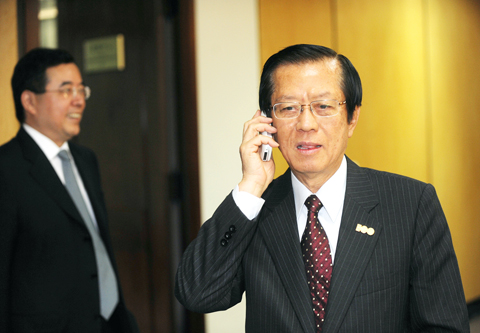Minister of Foreign Affairs Timothy Yang (楊進添) jumped to the defense of President Ma Ying-jeou (馬英九) yesterday after reporters questioned the propriety of Ma giving a Solomon Islands tribal chief a state-of-the-art smartphone as a gift during his visit last week to the South Pacific nation.
Chief Stanley Tapeva raised about 1,000 Solomon Islands dollars (US$120) in donations for victims of Typhoon Morakot, then spent hours in a boat and on foot traveling the 38km to the capital Honiara from his home in Kava, Isabel Province, to deliver the money.
Ma gave him the phone as a gesture of appreciation for all his hard work.

PHOTO: LO PEI-DER, TAIPEI TIMES
In a press conference detailing the government’s achievements during Ma’s state visit to the nation’s six Pacific allies, Yang showed reporters copies of English letters written by Tapeva to the press and Ma.
Yang said Tapeva was considered an intellectual in his country, and the chief knew a lot about cellphones.
Tapeva had written a letter to Taiwanese journalists saying that he had been using a cellphone for three years and that he owned three phones. Ma said Tapeva had thanked him in the letter for giving him the gift because he could use it to contact his sons, Taiwan’s technical mission and the Ministry of Agriculture, which has an office in Honiara.
Yang called the press conference after local reporters and legislators criticized the president for giving the chief a 3G HTC smartphone.
Media reports had questioned the appropriateness of the gift, suggesting it disregarded the needs of the chief and the mobile communications infrastructure of the islands.
Chinese Nationalist Party (KMT) Legislator Justin Chou (周守訓), a member of the Foreign and National Defense Committee, said the gift did not meet the needs of people of that country and that the government needed to review the decision to choose the cellphone as a gift.
However, Yang said the president “understood” the reason why the ministry chose the cellphone as a gift and considered the gift “appropriate.”
To prove that the chief knew how to use cellphones, Yang dialed one of the numbers during the press conference. Someone answered the phone, but did not identify himself and the call was cut off shortly afterwards because of bad reception.
Yang said reporters who wished to call the chief should wait until May because the Pacific nation is upgrading its international phone lines.
Ma also defended the gift of the phone yesterday.
“Even I don’t know how to use that phone,” Ma said. “It’s the latest model.”
“The Solomon Islands is not an underdeveloped country and Chief Stanley is not an uneducated man. In fact, he has had training in Australia and Kaohsiung,” Ma said. “He even told me that he felt like a minister because the cellphones I gave out were usually reserved for ministers.”
Ma said that when he was little, he went to a church in Wanhua to collect powdered milk, butter and old clothes donated by other countries. Now that Taiwan has become better off, it is time to pay back the generosity of the international community, he said.

Chinese Nationalist Party (KMT) Chairman Eric Chu (朱立倫), spokeswoman Yang Chih-yu (楊智伃) and Legislator Hsieh Lung-chieh (謝龍介) would be summoned by police for questioning for leading an illegal assembly on Thursday evening last week, Minister of the Interior Liu Shyh-fang (劉世芳) said today. The three KMT officials led an assembly outside the Taipei City Prosecutors’ Office, a restricted area where public assembly is not allowed, protesting the questioning of several KMT staff and searches of KMT headquarters and offices in a recall petition forgery case. Chu, Yang and Hsieh are all suspected of contravening the Assembly and Parade Act (集會遊行法) by holding

PRAISE: Japanese visitor Takashi Kubota said the Taiwanese temple architecture images showcased in the AI Art Gallery were the most impressive displays he saw Taiwan does not have an official pavilion at the World Expo in Osaka, Japan, because of its diplomatic predicament, but the government-backed Tech World pavilion is drawing interest with its unique recreations of works by Taiwanese artists. The pavilion features an artificial intelligence (AI)-based art gallery showcasing works of famous Taiwanese artists from the Japanese colonial period using innovative technologies. Among its main simulated displays are Eastern gouache paintings by Chen Chin (陳進), Lin Yu-shan (林玉山) and Kuo Hsueh-hu (郭雪湖), who were the three young Taiwanese painters selected for the East Asian Painting exhibition in 1927. Gouache is a water-based

Taiwan would welcome the return of Honduras as a diplomatic ally if its next president decides to make such a move, Minister of Foreign Affairs Lin Chia-lung (林佳龍) said yesterday. “Of course, we would welcome Honduras if they want to restore diplomatic ties with Taiwan after their elections,” Lin said at a meeting of the legislature’s Foreign Affairs and National Defense Committee, when asked to comment on statements made by two of the three Honduran presidential candidates during the presidential campaign in the Central American country. Taiwan is paying close attention to the region as a whole in the wake of a

OFF-TARGET: More than 30,000 participants were expected to take part in the Games next month, but only 6,550 foreign and 19,400 Taiwanese athletes have registered Taipei city councilors yesterday blasted the organizers of next month’s World Masters Games over sudden timetable and venue changes, which they said have caused thousands of participants to back out of the international sporting event, among other organizational issues. They also cited visa delays and political interference by China as reasons many foreign athletes are requesting refunds for the event, to be held from May 17 to 30. Jointly organized by the Taipei and New Taipei City governments, the games have been rocked by numerous controversies since preparations began in 2020. Taipei City Councilor Lin Yen-feng (林延鳳) said yesterday that new measures by